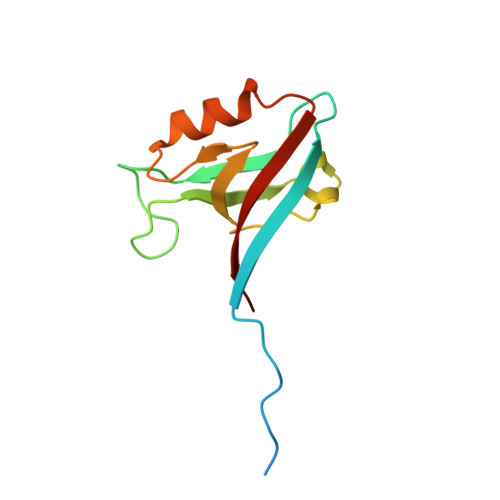Structural analysis of phosphorylation-associated interactions of human MCC with Scribble PDZ domains.
Caria, S., Stewart, B.Z., Jin, R., Smith, B.J., Humbert, P.O., Kvansakul, M.(2019) FEBS J 286: 4910-4925
- PubMed: 31317644
- DOI: https://doi.org/10.1111/febs.15002
- Primary Citation of Related Structures:
6MTU, 6MTV - PubMed Abstract:
Scribble is a crucial adaptor protein that plays a pivotal role during establishment and control of cell polarity, impacting many physiological processes ranging from cell migration to immunity and organization of tissue architecture. Scribble harbours a leucine-rich repeat domain and four PDZ domains that mediate most of Scribble's interactions with other proteins. It has become increasingly clear that post-translational modifications substantially impact Scribble-ligand interactions, with phosphorylation being a major modulator of binding to Scribble. To better understand how Scribble PDZ domains direct cell polarity signalling and how phosphorylation impacts this process, we investigated human Scribble interactions with MCC (Mutated in Colorectal Cancer). We systematically evaluated the ability of all four individual Scribble PDZ domains to bind the PDZ-binding motif (PBM) of MCC as well as MCC phosphorylated at the -1 Ser position. We show that Scribble PDZ1 and PDZ3 are the major interactors with MCC, and that modifications to Ser at the -1 position in the MCC PBM only has a minor effect on binding to Scribble PDZ domains. We then examined the structural basis for these observations by determining the crystal structures of Scribble PDZ1 domain bound to both the unphosphorylated MCC PBM as well as phosphorylated MCC. Our structures indicated that phospho-Ser at the -1 position in MCC is not involved in major contacts with Scribble PDZ1, and in conjunction with our affinity measurements suggest that the impact of phosphorylation at the -1 position of MCC must extend beyond a simple modulation of the affinity for Scribble PDZ domains.
Organizational Affiliation:
Department of Biochemistry & Genetics, La Trobe Institute for Molecular Science, La Trobe University, Melbourne, Victoria, Australia.




















